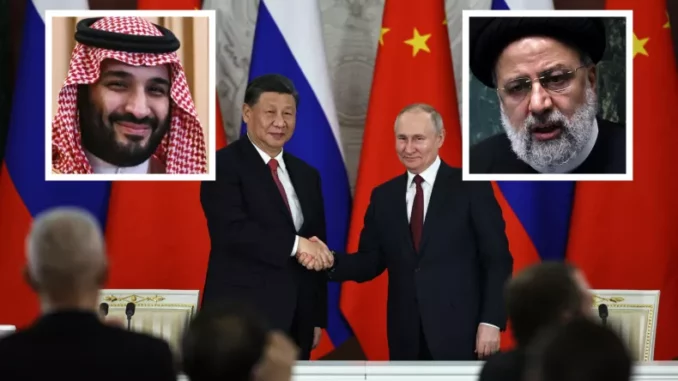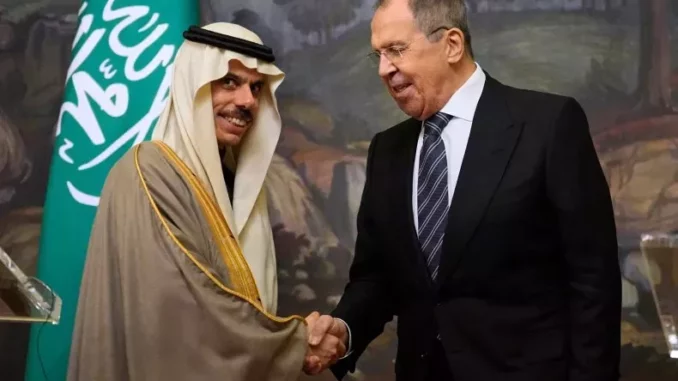BY
Chinese President Xi Jinping, left, and Russian President Vladimir Putin, right, are pictured shaking hands at their summit in Moscow on March 21, 2023, as the insets show Saudi Crown Prince and Prime Minister Mohammed bin Salman, left, and Iranian President Ebrahim Raisi, right.
Saudi Arabia’s decision to join the Shanghai Cooperation Organization (SCO) has come amid a wave of diplomatic initiatives in the Middle East bringing regional powers closer to China and Russia.
The decision, reached Wednesday through a memorandum approved by the Saudi Cabinet, would establish Riyadh as an official dialogue partner of the SCO, an economic and security bloc that counts China, India, Iran, Kazakhstan, Kyrgyzstan, Pakistan, Tajikistan and Uzbekistan as members. Other dialogue partners include Armenia, Azerbaijan, Cambodia, Egypt, Nepal, Qatar, Sri Lanka and Turkey, while observers include Afghanistan (whose participation is uncertain since the Taliban takeover), Belarus and Mongolia.
Tehran was the most recent to see its status upgraded from observer to full member in September and Riyadh’s decision came just weeks after a China-brokered deal to resume Iran-Saudi diplomatic ties.
For Saudi Arabia, the move is the latest step toward rebalancing its major power relations that have been traditionally dominated by its ties with the United States.
“The Kingdom is pursuing a portfolio strategy of developing a number of strategic partners to complement its relations with the West,” Ali al-Shihabi, a Saudi political expert who formerly led the Arabia Foundation think tank and now serves on the advisory board of the futuristic NEOM city project, told Newsweek.
“China and the multilateral organizations it has established are an important part of that, not only in strengthening the ties with China but by allowing Saudi to benefit from China’s relations with others like Iran.”
Meanwhile, the U.S. has placed itself on the sidelines.
“Saudi’s diversification strategy attempts to fill in the gaps left by the U.S.’ loss of interest or will in maintaining the status quo in the region,” Shihabi said.
“China being heavily reliant on Persian Gulf oil is the world power with the largest vested interest in a stable status quo in the Gulf,” he added, “and hence Saudi has worked to bring China into a more active role in helping stabilize this volatile region.”
China, for its part, has expressed enthusiasm about the development.
Xu Xueyan, charge d’affaires of the Chinese Embassy in Washington, D.C., told Newsweek that, “when there is lasting peace in a nation or a region, the nation is able to have more opportunities to seek partners for cooperation and development, and to seek broader security through regional platforms.”
“We congratulate Saudi Arabia on becoming a dialogue partner of the Shanghai Cooperation Organization (SCO),” Xu said. “China stands ready to strengthen cooperation with Saudi Arabia within the SCO to contribute more to safeguarding regional peace and stability and promoting common development.”
State Department deputy spokesperson Vedant Patel, on the other hand, offered a muted reaction during a press conference on Wednesday.
“This is not a new development,” Pedant said. “As you know, Saudi Arabia’s SCO dialogue – SCO status as a dialogue partner has been pending for some time. As you know, each country has its own relationships, and I would of course let the Government of Saudi Arabia speak to that.”
The relationship between the U.S. and Saudi Arabia entered a fraught timeline since President Joe Biden came into office two years ago.
Among the first major foreign policy decisions made by the incoming leader, who had previously referred to Saudi Crown Prince Mohammed bin Salman as a “pariah” over alleged human rights abuses, was to announce the end of combat assistance to Riyadh as it led a military campaign in Yemen against the Iran-aligned Ansar Allah, or Houthi, movement.
Shortly thereafter, he reversed his predecessor’s decision to list Ansar Allah as a terrorist organization, though the Biden administration has repeatedly condemned the group and its occasional attacks on Saudi Arabia.
The relationship grew increasingly strained after Russia launched a war in Ukraine last year. As energy prices soared over the conflict and ensuing Western sanctions against Moscow, Washington called on Riyadh to increase production, only for the Kingdom to join with Russia and other members of the extended Organization of Petroleum Exporting Countries (OPEC+) in cutting output in October.
Biden pledged there would be “consequences” for the move, as he ordered his administration to review its longstanding ties with Saudi Arabia.
By this point, Iran, longtime rival of Saudi Arabia, had officially joined the SCO, with President Ebrahim Raisi traveling to Uzbekistan to attend the group’s annual leaders’ summit in September. In addition to joining the SCO, Iran has also expressed interest in joining BRICS, another multilateral body led by China and Russia, along with Brazil, India and South Africa.
With Saudi Arabia also having eyes on both organizations, Chinese President Xi Jinping visited the Kingdom to host the first-ever China-Arab States Summit in December. The gathering resulted in a number of agreements being signed, and appeared to pave the way for further diplomatic breakthroughs.
Less than a month after Raisi met with Xi in China in February, a trilateral statement from Beijing, Riyadh and Tehran announced that a deal had been reached for the resumption of diplomatic relations between Iran and Saudi Arabia after an eight-year rift. Brokered by China, the deal signaled a new level of engagement from the People’s Republic in the region.
Reports have since emerged that Saudi Arabia has begun talks to restore ties with Syria, which has been suspended from the Arab League since civil war broke out in 2011. The reports came after Saudi Foreign Minister Prince Faisal bin Farhan traveled to Moscow to hold talks with his Russian counterpart Sergey Lavrov, who then met with SCO Secretary General Zhang Ming about a week later.
Azam al-Shdadi, a Saudi foreign affairs expert who is a member of the Kingston University Political Science Association, argued that this series of developments did not indicate a break in the relationship with the U.S.
“There is no doubt that the relationship between the Kingdom of Saudi Arabia and the United States of America is important and strategic for the two countries,” Shdadi told Newsweek, “and indeed for the world as well, because of the weight of the two countries politically, culturally and economically.”
“And there is no contradiction between this relationship and the Saudi response to the Chinese mediation that aims to achieve stability in the Middle East region,” he added.
However, he argued that “all of this depends on the extent of Iran’s commitment to the principles of this important agreement.”
“And from here,” he added, “we can say that the Kingdom, along with other powers such as China, provided cooperation that resulted in an agreement that is considered fateful for the region and also builds for future agreements with many countries for the benefit of the region and the world as a whole.”
>
Shortly after the agreement was reached, the Iranian mission to the United Nations told Newsweek that “the Iran-Saudi Arabia relationship is significant on three levels: bilaterally, regionally, and internationally.”
“Resumption of political relations between the two countries will benefit all three areas, including the region and the Islamic world,” the mission said at the time. “It seems a resumption of political relations will speed up Yemen’s development for establishing a ceasefire, starting Yemeni-Yemeni dialogues, and forming an inclusive national government.”
All three major factions of the eight-year conflict in Yemen have welcomed the Iran-Saudi deal as well as China’s role in it, though mistrust remains rife in the war-torn nation.
And despite the bad blood built up between Riyadh and Tehran over the past years, Shdadi was hopeful the deal could provide positive outcomes not only for the two nations and the broader region, but also the U.S., which has otherwise largely focused on a military approach to the region.
READ MORE<
>
- In their own words, Yemen war rivals see wary hope in China-Iran-Saudi deal
- As U.S. pressure mounts, China and Iran see chance to transform their ties
- Xi wins over Arab leaders looking beyond U.S. in one of most powerful trips
- Trump hailed as “destroyer of America” on Russian state TV
<
>
<
>
<
>
“The stability of the Middle East and the economic prosperity of its countries will give the United States of America more economic opportunities with a developmental dimension to participate in emerging economies,” Shdadi said, “in contrast to previous opportunities with a military dimension and based on tensions and conflicts.”
The current approach, he argued, “is undoubtedly a new opportunity that was not available in the past due to the absence of a vision in the region and the tense relations between its countries.”
In this regard, Shdadi also saw new opportunities and “many benefits” in Saudi Arabia’s bid to grow closer to the SCO, a step, he said, “comes within the framework of Saudi Arabia’s openness to the world, especially East Asia, economically and politically, and in support of international stability.”
These include greater ties among members in terms of trade and cultural exchange, as well as stronger integration in economic, industrial, technological and security affairs.
Shdadi also said that Saudi Arabia’s dialogue partner status “gives the organization deep international weight” due to Riyadh’s leadership status in major global institutions such as the Organization of Islamic Cooperation (OIC) and OPEC as well as its position as the largest economy in the Arab world and fastest-growing economy among the G20 states.
“It is natural for Saudi Arabia to be present in such organizations,” Shdadi said, “which constitute an important political, economic and cultural dimension for the Kingdom and for the countries of the Shanghai Organization alike.”
This article has been updated to include comments from Chinese Embassy to the United States Charge d’Affaires Xu Xueyuan.
<
>
<
>





Leave a Reply
You must be logged in to post a comment.